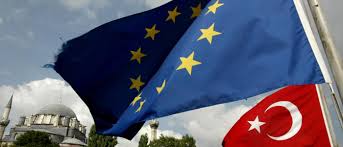Turkey’s troubled relations with EU was saved another complication, as Foreign Policy Chief Borrell said there were no immediate decisions at Monday’s meeting, but that the ministers would revisit the issue at their next meeting in Berlin in August.
Ministers tasked Brussels with coming up with a way to lower tensions with Turkey.
There was broad support for Borrell to “explore further paths that could contribute to lowering tensions and reach understanding on issues that are increasingly stressing the relations between Turkey and the European Union.”
Borrell added that he would prepare options on “further appropriate measures that could be taken in response to the challenges we are facing as a result of Turkish actions”.
It was agreed that Borrell will come with a list of targeted measures against Turkey in August, which would be activated only in case Turkey abuses Greece’s sovereign rights.
“There was a broad consensus to make, after we requested for it, a list with further measures, which means sanctions which will allow the EU to respond efficiently if Turkey goes on with its offensive/violating behaviour,” said Nikos Dendias, Greece’s foreign minister, after the meeting.
In their first face-to-face meeting in several months, the European Union’s 27 foreign ministers discussed Turkey’s move on Hagia Sophia as one of the issues at the top of the agenda of their meeting. The EU foreign ministers were led by the EU foreign affairs chief, Josep Borrell.
Hagia Sophia (“Holy Wisdom”) is the former Greek Orthodox Christian patriarchal cathedral, later an Ottoman imperial mosque and now a museum (Ayasofya Müzesi) in Istanbul, Turkey. Nominally, use of the complex as a place of worship (mosque or church) is strictly prohibited.
The ministers unanimously condemned Ankara’s decision to convert such an emblematic monument as the Hagia Sophia into a mosque. They also condemned Turkey for illegal drilling in the Eastern Mediterranean.
“This decision will inevitably fuel the mistrust, promote renewed division between religious communities and undermine our efforts at dialog and cooperation,” said Borrell after the meeting of EU foreign ministers. “When I see now what is happening with Hagia Sophia, that is a blow,” Luxembourg Foreign Minister Jean Asselborn said.
The cathedral of Hagia Sophia was built in the 6th century, at the entrance to the Bosphorus Strait in Istanbul. It was converted into a mosque in the 15th century, and transformed into a museum in 1934 by a decision of the founder of secular Turkey, Mustafa Kemal Ataturk .
On Friday, the State Council, the Turkish highest administrative court, overturned the government’s 1934 decision. The country’s President, Recep Tayyip Erdogan, announced moments later the opening to Muslim prayers of the building, which was classified as World Heritage by UNESCO, and is one of the main tourist attraction sites in Istanbul.
Borrell visited Turkey last week and spoke of Ankara’s disputes with Greece and Cyprus over energy exploration in the eastern Mediterranean region. Turkey has been drilling gas in a territory that Cyprus insists it owns.
Cyprus considers Ankara’s actions as being contrary to international obligations, as well as international law, and said that Greece would consider possible “political, diplomatic and financial” sanctions.
Borrell said there were no immediate decisions at Monday’s meeting, but that the ministers would revisit the issue at their next meeting in Berlin in August.
In addition to Greece, whose foreign minister, Nikos Dendias, is asking for a list of new sanctions on Turkey, France is also very critical of Ankara, in light of the tension between the two countries over the conflict in Libya. This was aggravated by an incident between ships of the two countries in the Mediterranean in early June.
Yesterday, the head of the Catholic Church, Pope Francis, said that he was “pained” by Turkey’s move to convert Istanbul’s Hagia Sophia back into a mosque.
Speaking during a mass service in the Vatican, the pontiff stated thus: “My thoughts go to Istanbul. I think of Santa Sophia and I am very pained,” he said during his weekly blessing in St. Peter’s Square.
Turkish view
Turkey doesn’t recognize Greek Cypriot Administration as the sole sovereign of Cyprus, insisting the run-away republic of Turkish Republic of Northern Cyprus should have equal diplomatic rights. It signed an Exclusive Economic Zone Treaty with the Government of National Accord in Libya, which grants it drilling rights in large swathes of Eastern Med, over which Greece claims sovereignty.
While many of the tensions between Turkey and EU are the making of Erdogan administration, such as holding foreign nationals as hostages to be bargained against dissenters and Gulenists residing in EU and an endless crack-down on even the mildest form of protest, the Cyprus issue is a national cause for Turks of all political stripes. EU’s failure to recognize TRNC and treating minority Turkish Cypriots as a non-entity has dimmed the desire of Turks to join EU. While a slim majority of Turks still consider EU membership as the Holy Grail for faster socio-political development, the partisan approach by it towards Cyprus and Turkey’s littoral rights in Mediterranean Sea has substantially cooled off interest for fighting for the cause.
You can follow our English language YouTube videos @ REAL TURKEY: https://www.youtube.com/channel/UCKpFJB4GFiNkhmpVZQ_d9Rg
And content at Twitter: @AtillaEng
Facebook: Real Turkey Channel: https://www.facebook.com/realturkeychannel/
